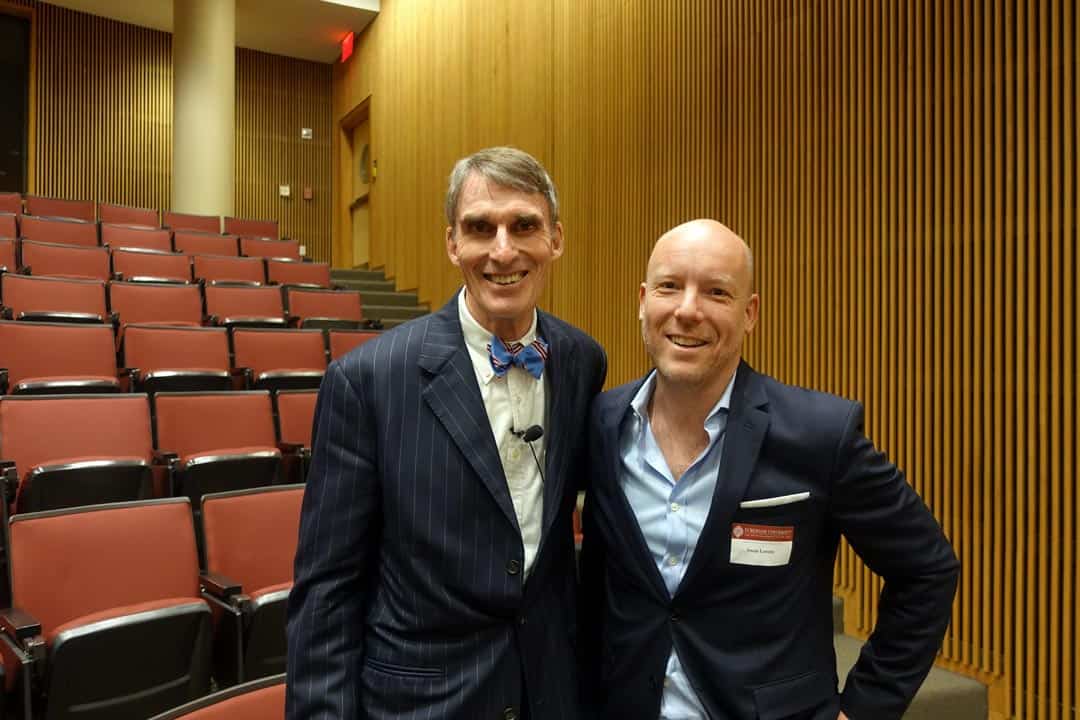I first benefitted from his insights without even knowing of him. I indirectly stumbled across Jim as the author of Bernard Baruch's biography (the 20th-century speculator turned advisor to multiple US presidents, and one of my stock market heroes). I had initially bought the book because I gobbled up any publication about Baruch, but not knowing what other work its author had done.
When I recently had a chance to see Jim at a lecture and reception in New York, I jumped at the opportunity.
Jim's recently published book no. 9 is "Bagehot – The Life and Times of the Greatest Victorian". Bagehot, as I have now learned, was a character whose influence is transcending through the ages. Some of the world's leading publications for investors - The Wall Street Journal, the Financial Times, Forbes, and Barron's - have already strongly endorsed the book.
Hearing Jim talk about Bagehot's work and seeing how engaged the audience became, I mentally started to draw up a list of the most pertinent points I took home that evening.
I asked myself: "What is it that has made Jim such a fixture in investment publishing and media circles? Why do so many private investors find it useful to follow his work?"
An exciting evening and a few glasses of wine later, I now realise why so many have found his writing valuable ever since he first put pen to paper in 1983 to launch his own publication.

For he's a jolly good fella.
#1: Boring as interest rates may be, the subject HAS to be on your investment radar
Jim's day-to-day task is to write Grant's Interest Rate Observer, probably the world's most famous bi-monthly niche publication dealing primarily with interest rates (and stock picking thrown in for good measure). It comes with a price tag of USD 1,295 per year and has been essential reading on Wall Street for nearly four decades. There is probably hardly a hedge fund billionaire in New York who isn't a subscriber.
Mind you, interest rates is not really a subject that would blow any normal person's socks of. I find it a mind-bogglingly boring subject.
Jim is a master at conveying why the subject matters. As he put it: "Interest rates are the most important price in capital markets. The prevailing rate of interest determines how capital gets allocated."
Put another way, interest rates are the mechanism that guides all other investment decisions.
Right now, we are in an era that Bagehot would surely find most interesting to observe as far as interest rates and capital markets are concerned. He'd probably be amused, fascinated, and shocked all at the same time.
Worldwide, there are now USD 14 TRILLION of outstanding bonds that pay a negative interest rate. Put another way, very intelligent people are now buying assets that are contractually guaranteed to ultimately generate a loss. They purchase these assets because they believe someone will buy them at a higher price from them in the not too distant future. Never mind the fact that that someone will find the bond's value decrease because of its negative interest rate. It's the ultimate game of musical chair. Some someone will end up holding the bag, some day.
Right now, due to the unprecedented measures taken by central banks in Europe and elsewhere, the cost of capital is artificially distorted like never before. It leads to all other investment decisions getting distorted, too. Never before in 5,000 years of human and monetary history has a situation of this magnitude arisen.
It's a confusing and dangerous time for anyone with savings. It doesn't matter whether they are invested in bonds, stocks, real estate, or any other asset class. Negative interest rates touch everything.
You, too, will undoubtedly be affected by this situation in some shape or form.
The question is, how exactly?
That's where Jim's writing about interest rates comes in so useful. He has a unique ability to get the importance of the subject across in a riveting and instructive way. You can get a taster by watching this 26-minute video where he debates whether the Federal Reserve Bank should be celebrated or condemned.
If Jim Grant's writing about interest rates doesn't get you interested in the subject, nothing else will. Nearly four decades of writing about the subject and keeping his entirely independent publication relevant for a large number of dedicated readers, he is truly the master of writing about interest rates. Come to think of it, even the Federal Reserve Bank once invited him as speaker.
I myself am now looking forward to eventually finding the time to read my dedicated copy of the Bagehot book in front of my fireplace on Sark. And I'll be looking out for Jim's column in Barron's, or might even attend one of his regular conferences in New York.
#2: Financial markets are about cycles, and history teaches you about cycles
People who invest want to know what's going to happen tomorrow. They want to make investment decisions that are informed and forward-looking.
For that, knowledge and understanding of the past is one of the most valuable tools available to you.
The world may have never previously experienced something similar to the current phenomenon of negative interest rates for countless trillions worth of interest-bearing assets.
However, the underlying causes and symptoms have all been seen before. Financial markets are cyclical, and there isn't anything under the sun that hasn't been observed previously.
A central bank "ending a financial crisis by filling the pockets of those who created it in the first place" – sounds familiar? It is something that Bagehot wrote about nearly two centuries ago.
Governments debasing money to create artificial wealth?
Investors and savers getting wiped out by unexpected changes to the financial system?
These are all seemingly eternal subjects, and they have a direct effect on what's in your wallet, bank account, or brokerage account.
"History teaches you how to spot these cycles," is how Jim Grant describes it.
It's the possibility to use lessons from the past to more accurately predict the future, that makes his various books about the characters and events of financial markets history so useful.
You cannot possibly overstate the value of knowing and understanding history to minimise the number of occasions when your expectations of the future prove to be off the mark.
As I said, by now you already have nine history-related books to choose from even if you just stick to Jim Grant's writing. There is also a plethora of books available from other authors who have taken up subjects relating to financial market history.
Ignore these resources at your own peril.
3: Some of the most interesting reading is found outside of the mainstream media
If you watch Jim's 3-minute video in which he describes his own writing, you'll hear that his readers enjoy his ability to engage in heretic thinking.
Given that you have found your way to my website, you are probably well in tune already with the idea of hunting for unconventional, controversial viewpoints to advance your investment success.
I just did a quick count and realised that I follow about 300 different publications, blogs, and channels that are not part of the mainstream media. My reading routine also includes a broad selection of entirely conventional publications, but it's often in the more obscure sources that I find the most interesting thoughts and ideas for my investing website and to shape my thinking.
Grant's Interest Rate Observer was once almost purchased by the Financial Times. However, for now it remains a staunchly independent publication. It's widely known to have a strong balance sheet. Financial independence allows it to report without pressure from advertisers or other factors that would unduly influence its author's views.
If you aren't already subscribed to a variety of sources that offer you an alternative take of things, you should seek out a few more of them.
To help you with it, I have decided to create "Blogs to watch". This occasional column, starting next week, will feature blogs and news sources that you are unlikely to have ever heard of, but which I suspect will be of use to a good percentage of my readers. Most of them will be free, or at least offer some free content. None of them will pay me for writing about them – that goes without saying.
This new series will also be a result of emails I have received from readers who asked me for recommendations about other investing websites.
Next week – the next cycle that history indicates we'll soon see unfold
There are probably less than ten widely known investment authors around the world that have had Jim Grant's staying power and lasting appeal.
However, there is also a generation of younger independent authors rising through the ranks. The somewhat strange times we are living in give us all the more reason to follow them.
Next week's Weekly Dispatches will give you a practical example of much of what I wrote about above:
- A historical perspective of an ever-repeating cycle.
- A niche-authoress who does superbly impressive work.
- Concrete conclusions you can use in your investment decisions.
That upcoming column will be aimed at helping to guide your investment decisions for the next three, five, or ten years. It'll guide you towards a website you can read alongside mine, to give you an additional informed point of view to take into consideration.
Stay tuned for more, and see you again next week.
Did you find this article useful and enjoyable? If you want to read my next articles right when they come out, please sign up to my email list.
Share this post:
Get ahead of the crowd with my investment ideas!
Become a Member (just $49 a year!) and unlock:
- 10 extensive research reports per year
- Archive with all past research reports
- Updates on previous research reports
- 2 special publications per year








